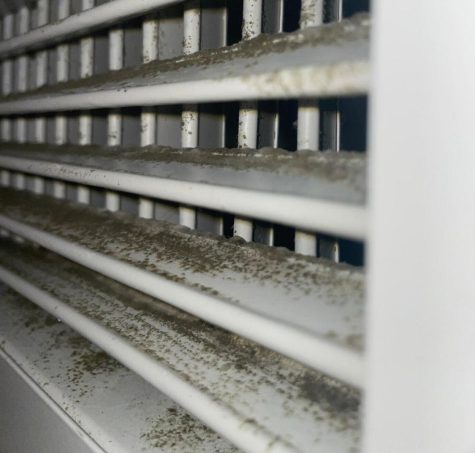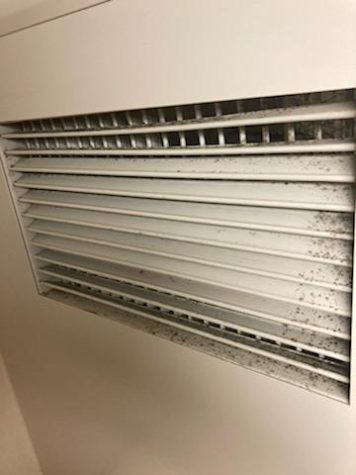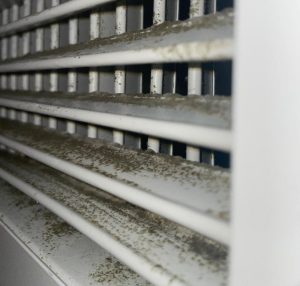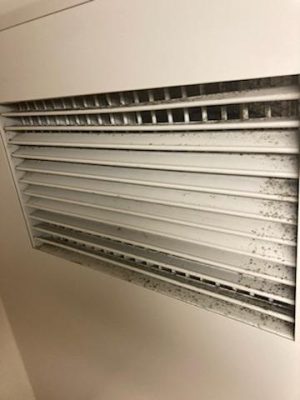Students affected by mold will not receive financial compensation; 450 rooms affected
September 29, 2022
Kent State does not plan to provide financial compensation to students living in the 450 rooms impacted by, or in close proximity to, mold and mildew.
Briley Rhinock, senator for residence halls, asked if students would receive financial compensation for inconveniences or accommodations if the situation affected classes.
Gary Goldberg, Kent State’s assistant vice president for student engagement and services, said “no” at Wednesday’s Undergraduate Student Government meeting, called to address recent concerns of mold found in residence halls.
Reports of mold in campus dormitories began to surface the week of Sept. 19. Varying reports from the university stated from five to eight rooms were affected. In an interview with TV2 and KentWired, University President Todd Diacon said eight rooms had mold. An email sent Sept. 27 from University Housing stated, “In a handful of rooms with a high humidity level, UFM staff have found mold.”
An email Sept. 29 between KentWired.com and University Communications and Marketing’s Emily Vincent stated, “The number is five. All five rooms are in Fletcher Hall. The university has cleaned three rooms, and two more are being scheduled for this week. Keep in mind that 900 students live in Eastway, just so you have perspective as to how few rooms we are talking about compared with the whole.”
Students will not receive money for damages, and Goldberg pointed them to professors or the Office of the Student Ombuds if they have academic concerns.
Goldberg said the university failed to complete enough cleaning prior to the start of fall semester, and the amount of rooms affected is something “we are not infrastructurally prepared to handle.”
“We lost a little bit of time as far as preventative maintenance that we can do in these rooms, because mold is a natural thing that happens this time of year,” Goldberg said.
University Facilities Management (UFM) completed cleaning 40% of the 450 affected rooms, part of the short-term cleaning process outlined by the Centers for Disease Control and Prevention.
“From a long-term standpoint, the building in the manner they constructed need to change,” Goldberg said. “We don’t have what’s called ‘fresh make up air’ flowing in each room.”
For now, they are cleaning vents and installing bipolar ionization units to improve the air quality. Goldberg called these units a “significant investment.”
This will affect students like freshman journalism major Hevin Wilkey, who moved out of her room in Fletcher Hall on Sept. 19.
Multiple students indicated to KentWired that since moving into residence halls within the Eastway complex, they have experienced sore throats, coughs, difficulty breathing, nausea and more symptoms that are contradictory to their typical health conditions. Some of these students also told KentWired these symptoms led them to go to the hospital or seek medical attention, including providing medical records indicative of mold exposure diagnoses.
Wilkey moved home temporarily to escape her residence hall’s conditions. Goldberg said multiple students chose this route: One chose to permanently move to another residence hall, and several others temporarily relocated to other residence halls.
Cade McCue, junior architecture major and senator for the College of Architecture and Environmental Design, asked Goldberg about this relocation process.
“You said some students have been given the option to relocate. Was that option presented to everyone?” McCue asked. “And then, what facilities are being used for relocation?”
Goldberg answered that students living in Eastway residence halls – Allyn, Clark, Fletcher and Manchester halls — have the option to relocate to other residence halls on campus.
A student in the audience asked if preventative maintenance would happen for the rest of the fall semester, and Goldberg said no. Students must use request forms sent in an email to on-campus residents to have UFM examine and clean their rooms.
More communications from University Housing go directly to Resident Assistants and Graduate Assistants, Goldberg said.
“They need to be the first line of defense,” he said.
Editor’s Note: More information was added regarding students’ reported physical reactions to the conditions in their rooms.
Sophie Young is a reporter. Contact her at [email protected].




























